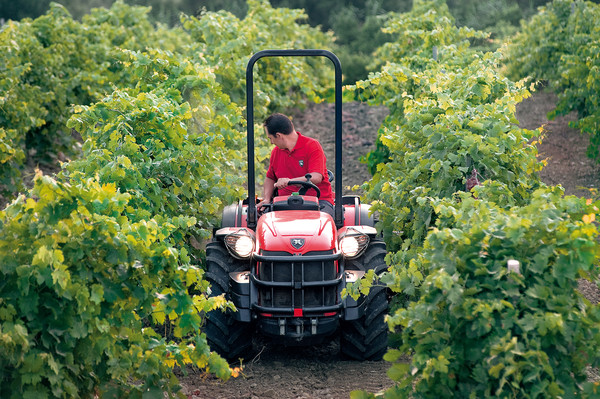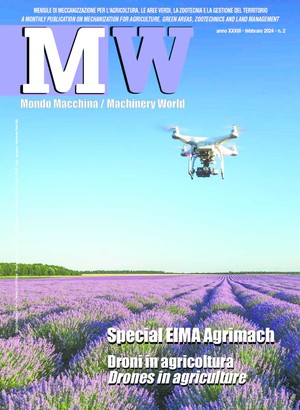
Norms for tractors, an illogical turn of the screw
The Italian association of agricultural machinery manufacturers presents in Milan its information and promotion initiatives. The presence inside three exhibitions on agri-food chains and a demonstration event in the field serve as a reminder that agricultural engineering is fundamental for every production chain
The Italian tractor industry is facing the risk of seeing their nascent economic recovery blocked at the onset. Entire industrial districts are alarmed by the European Union norm on tractor engine emissions, which would be difficult to apply due to technical considerations and unsustainable economic factors, and carries the risk of knocking a par excellence Made in Italy mechanical engineering sector out of the market. The regulation, drafted for the large numbers of automobile engines, fails to take into account the characteristics of specialist tractors for vineyards and orchards, the so-called narrow-track tractors, built for functions which are extremely specific. For the installation of new devices required by the Phase IV regulation coming to the market on 1st October 2017, the engine compartment of these tractors must be redesigned and their bodywork and overall size will have to be modified to result in penalizing their maneuverability and ability to operate between rows in vineyards and orchards. Assotrattori – the association in the Italian Agricultural Machinery Manufacturers Federation, FederUnacoma, which represents the tractor sector, including such prestigious brand names as Agritalia, Antonio Carraro, BCS Group, Goldoni, Landini, McCormick and others – has explained that the costs involved in transforming these narrow-track tractors cannot be written off because with a total of 20,000 units sold annually in Europe, economy of scale cannot be applied. Assotrattori also noted that diesel exhaust aftertreatment systems increase the sticker price of the tractor to the point that makes them inaccessible to potential purchasers and would leave them unsold. The damage wreaked on the industrial districts where these manufacturers are located as well as on associated agricultural machinery and components in the sector would be irreparable as regards their economies and jobs.
Factories located in highly specialized mechanical engineering districts such as Milan, Padua, Reggio Emilia, Modena and others where substantial research and development investments have confirmed their global leadership would be tipped into serious crisis conditions by a norm which is inappropriate for agricultural mechanics in that it takes no account of the operational requirements of farmers and contractors. The tractor sector hit by the norm accounts for sales of more than € 2 billion, out of a total of some € 8 billion for all agricultural machinery and equipment, and employs about 10,000 people directly and in auxiliary sectors, out of more than 100,000 jobs in the entire agricultural machinery sector. This means that the application of the norms according to the ways and timetable currently planned would involve the risk of extremely serious repercussions for business and the occupation level. The seriousness of the situation has been illustrated by Assotrattori and FederUnacoma in EU quarters where the procedure for the revision of the measure on emissions of off-road vehicles is fully under way. The Commission granted a first extension in 2011 which enabled updating for compliance with the present Phase IIIB and, the association said, a new extension would provide better prospects for a sector forced to pursue continuous compliance with norms leading, by 2020, to a further step, that of Phase V. The ongoing turning of the screw of these increasingly binding regulations for the tractor sector, especially narrow-track tractors, is creating a paradox by damaging manufacturers while making their tractors less efficient and more costly and, at the same time, slowing, rather than promoting, any progress in the renewal of the tractor inventory and thus negating the possibility of improving their impact on the environment.Trattori compatti: battaglia
Narrow-track tractors: battle in the european Parliament
On May 7th, MEP Elisabetta Gardini, European Parliament rapporteur on the Environment, Public Health and Food Safety ENVI Committee, presented a lengthy report on a proposal for a regulation on requirements relating to emission limits and type-approval for internal combustion engines for non-road mobile machinery which again opened the question of narrow-track tractors. Gardini opened her report on the proposal by the European Commission for off-road vehicles by underscoring the point, among others, that the draft is not compatible with the technical characteristics of narrow-track tractors used for operations in vineyards, fruit orchards and the like. Because of their specialized work and the size of their engine compartment, manufacturers of these tractors cannot install the engines including the after-treatment systems and at the same time continue to meet the operational requirements in terms of size and manoeuvrability unless they are totally redesigned at costs which could not be sustained by the industry nor by farmers and contractors seeking to purchase these machines.








